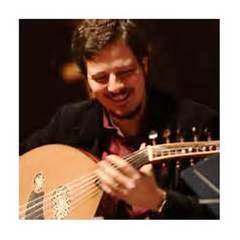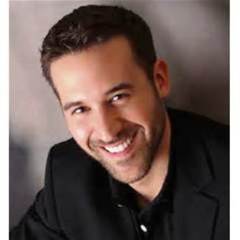|
Back
The American Composers Orchestra New York
Zankel Hall, Carnegie Hall
04/01/2016 -
“Orchestral Underground: Eastern Wind”
Saed Haddad: Manarah (World Premiere)
Gity Razaz: Metamorphosis of Narcissus
Mehmet Ali Sanlikol: Harabat/The Intoxicated (World Premiere)
Reena Esmail: Avartan for Orchestra and Video (World Premiere)
Matthias Pintscher: Songs from Solomon’s Garden
Mehmet Ali Sanlikol (Vocals and Ud), Steven LaBrie (Baritone)
American Composers Orchestra, George Manahan (Music Director and Conductor)
Neeraj Jain (Video Artist)

G. Manahan (© Richard Bowditch)
It’s audacious, but after last night’s concert of the American Composers Orchestra, I was ready to rechristen the first name of conductor Manahan from “George” to “Otto.” Specifically, he could be called “Otto Manahan”. Or, to explain this weak play on words, Ottoman (with an “ahan” added).
Three of the five pieces for this “Eastern Wind” concert came from remnants of the Ottoman Empire. And while not a single commonality arose from the works embracing Cyprus, Turkey, Palestine, as well as India, Egypt and Persia, Mr. Manahan had every right to call himself, as the Sultans of the Empire called themselves, a Lord of the Horizon.
In fact, the first work was so intense, such a combination of opening fanfare, of Janissary percussion (Beethoven’s music in the Ninth) and such a warlike beginning that I gave it an imaginary re-composition.
Manarah, by the German-Jordanian composer Saed Haddad, means “harbor”, and its two “digitally transposed antiphonal trumpets” on the right and left balconies, were supposedly like lighthouses. The trumpets would signal the orchestra on stage, as well as giving electronically musical changes which no ordinary trumpet would give. Mr. Haddad compares these sounds to those of the great Egyptian singer Oum Kalthoum, though no human instrument could imitate her endless musical lines.
It was a fine opening, but I pictured Mr. Haddad rewriting it to be played on both shores of the Bosporus. On the Asian side, place 100 trumpets on a battlement of Topkapi palace. On the European side, placed 100 trumpets on small hill above port. In the Bosporus Strait, a large ferry would contain the orchestra (conducted by Mr. Manahan, of course).
It would be epic music, close to Scriabin’s Universe Symphony, and Mr. Haddad’s expertise to give the fabled Ottoman glory. (While the solo brass could be re-titled the Golden Horns.)

M. A. Sanlikol (© Courtesy of the Artist)
Los Angeles-dweller Mehmet Ali Salikol is well known on the West Coast as singer, writer, virtuoso Ud player, and a member of the eclectic jazz community.
With the first notes of Harabat/The Intoxicated (co-commissioned by Carnegie Hall), I felt cheated. I had been expecting something more mystical with the Sufi poem, and instead I had an orchestra playing rather ordinary jazz-pop chords.
But why go with my expectations? Mr. Salikol did manage to merge three forms into one. The orchestra was predictable, his Ud playing was technically brilliant, his singing was very much in the Turkish pop form, and we had a conservative jazzy essence. This was his music, and my respect for it at the end, was very great indeed.
Iranian-American Gity Razaz offered a work about Narcissus, which, while deftly composed, seemed more pure atmosphere than drama. Still, the sounds she achieved by a merger of piano and Brunei (or Tibetan) gongs was original, and its eight minutes were never boring.
A confession that my favorite work, Mr. Haddad’s Harbors was based on a personal love for Istanbul. And my second favorite, Reena Esmail’s Avartan, was for a second favorite city, Mumbai, where the video was set.
An Avartam is a complex musical-and-philosophical trope, where a rhythmic cycle returns to its point of origin, “while simultaneously moving the music forward into new territory.”
Musically, she did this with a slow-moving orchestral palette, and a piano which repeated–like an essential signet–two notes rising up a fourth. The repetition perhaps divided the cycles, but musically it was a landmark, a tiny theme for which one waited, giving a sense of contentment to the work.
But this was also music with video. Not a video with tricks and heavy editing. Instead, video artist Neeraj Jain had stationed himself near the Mumbai port, taking 10-second shots of different people looking directly into the camera.
Usually, they were still, sometimes a child broke into a smile, sometimes we could see the boats in the background. But within the 15 minutes, we probably had near 100 portraits, each evocative, each different from India’s most international city. They were extremely beautiful, vivid, and in a non-visceral way, were part of the music.

S. LaBrie (© www.Stevenlabrie.com)
The final piece came from the only composer with whom I was familiar, Matthias Pintscher. Mr. Pintscher had spent two years in Israel, and his Songs From Solomon’s Garden was not only the longest and emotionally the most distant, but its singer, bass-baritone Steven LaBrie, was the most cogent performer.
Composed in the Song of Solomon Hebrew from which we get the King James version, “I am the rose of Sharon…” Mr. Pintscher had taken the entire series of verses, and Mr. LaBrie gave it a fiercely emotional reading with Mr. Pintscher’s usual brilliant orchestration.
This was not simulation of possible Old Testament music, but Mr. Pintscher did approach it. The solo instruments from the large orchestra were quite Biblical: the harp, the brass solo, the oboe. The orchestra had some repeated “punctuation” marks, tutti passages that may have divided the verses. The scales were our own, but Mr. Pintscher managed them so they sounded (oh, how I hate the word) exotic, or Semitic or…well, far away from ourselves.
But it was Mr. LaBrie who gave it the power. A stentorian voice, partly declaiming, partly in long paragraphs, nothing lyrical but–had I understood the Hebrew, which was translated in the program–I would have found dramatically mighty and muscular.
And no, this did not have the fairly transparent meaning of the other works, but in its very mystery, Mr. Pintscher added to the enigmas of the geography and the music.
Harry Rolnick
|